This year’s theme for Wayne Community College’s science celebration was “Homegrown” but the event was out of this world.
From the 1 billion-year-old fossil displayed by the NC Fossil Club to the WCC Transportation Department’s hydrogen fuel cell demonstration, the Homegrown Science in NC’s two dozen activity stations ranged from prehistoric to futuristic with a lot of today in the Tar Heel State in between.
Participants in Saturday’s event looked to the skies and made aerodynamic paper airplanes to celebrate being “first in flight,” tested their knowledge of native bird species and their silhouettes, and met an owl, vulture, and a couple of hawks from Hawk Manor Falconry.
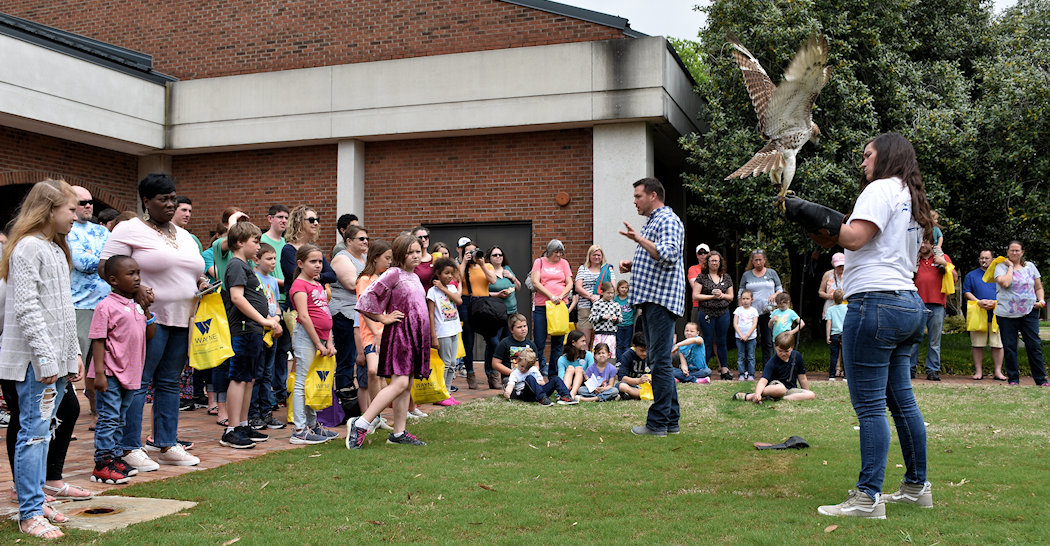
They got down to earth by looking through a microscope at plankton, planting peanuts and seeds, digging in the “fossiliferous” material provided by the Aurora Fossil Museum, learning the “waggle dance” that bees use to communicate information like flower, hive, and water locations, and fashioning their own paper plate carnivorous plants like North Carolina’s endemic Venus fly trap species.
Representatives from the Wayne County Beekeepers Association, Wayne County Amateur Radio Association, and the college’s Simulation and Game Design, Forest Management, and Agriculture programs gave participants a taste of their fields. The experts provided educational opportunities that included virtual reality experiences that took viewers from foreign destinations to NC farms and agricultural industries, slices of Tar Heel trees, and a living bee hive section.
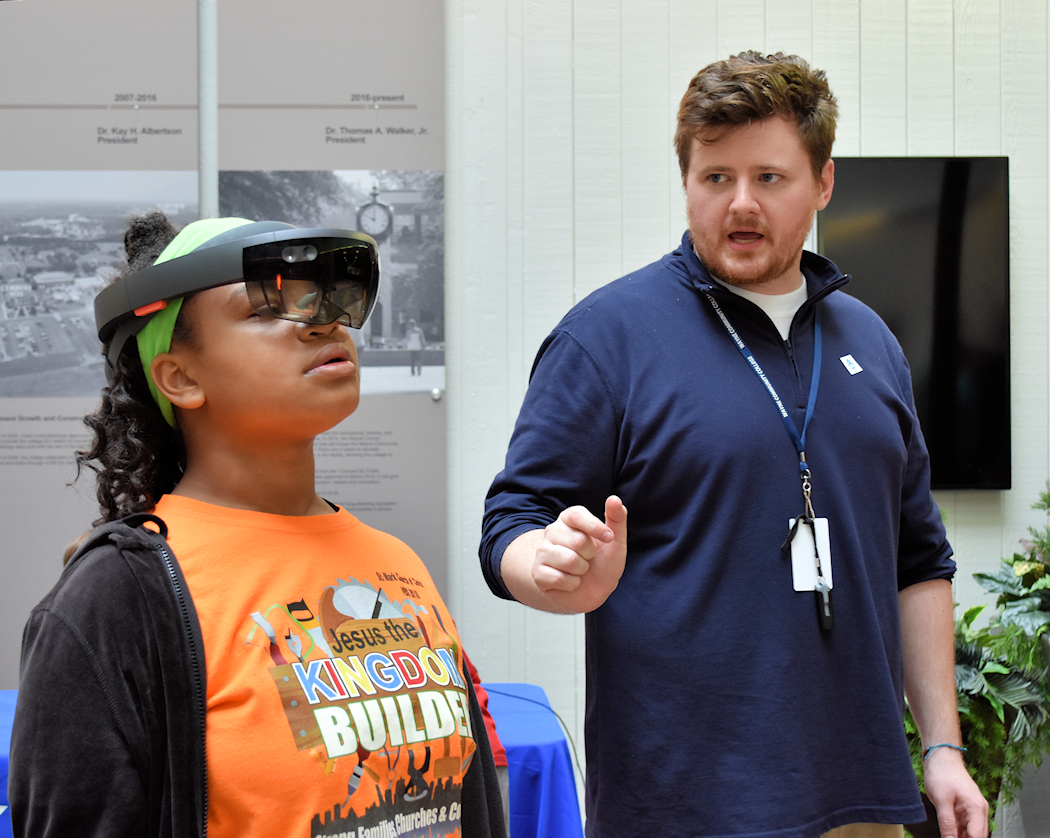
Some of the most popular activities involved playing with food: making a pickle battery and invisible soda, experiencing a Mentos geyser, churning tiny cups of ice cream using ice and creamer cups, extracting DNA from a strawberry, creating art using sweet potato stamps, and rubbing together sandwich cookie halves to understand earthquake dynamics with a Cliffs of the Neuse State Park ranger.
NC Fossil Club representative Douglas Hill was in his element. A Wake Technical Community College student majoring in anthropology and geology, he was energetic as he discussed the pieces he had brought from his own fossil collection, most gleaned in this state, that spread across two tables.
“This has been a hobby since I was a little boy,” he said. “I hope to spark a little bit of curiosity. I want to plant a seed in their minds that makes them want to learn more.”
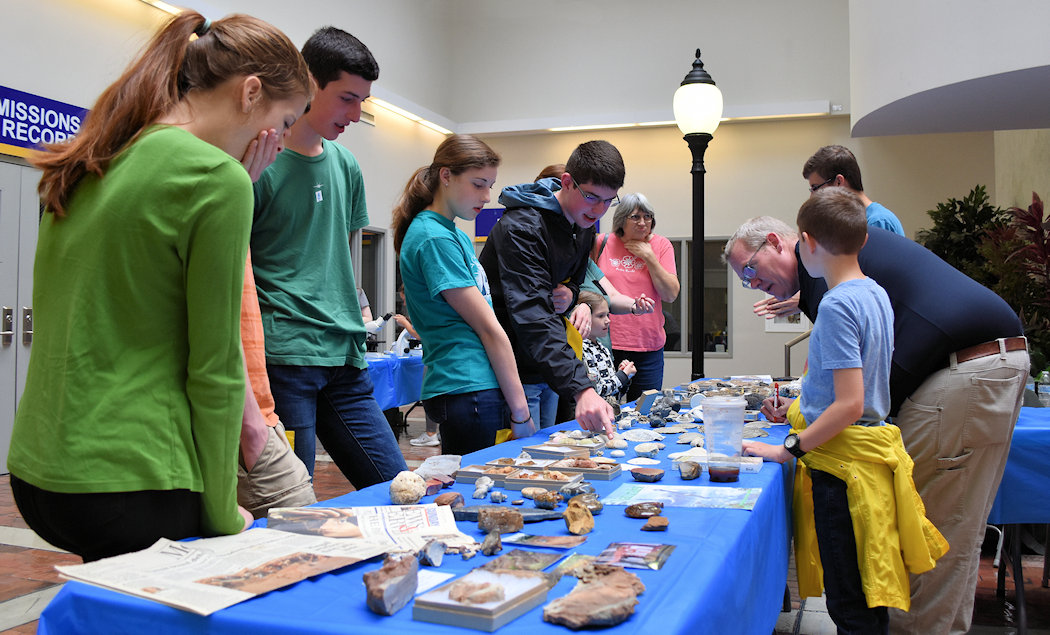
While her five-year-old son Jack McGettigan dashed off to do “just one more activity,” Andrea Freile said that she got as much out of the event as he and her teen-age daughter did. “I learn something every time,” she said.
Lewis Garner and his three children were among the first in the door. “This is our second year and I’d come back next year,” he said. “There was something for every kid.”
Elijah Wilson, age 8, exclaimed that “It was so much fun. I can’t wait to try making the geyser at home with the soda and Mentos.”
Elijah’s mother, Maegen Wilson, was pleased with the way the activities were conducted. “Eli has dyslexia and the hands-on learning is so helpful for him,” she said.
Brayden Davis, 10, called the fair “really cool and scientific!”
“The best thing was learning about the different science things in North Carolina,” he said. “And the ice cream that I learned how to make was awesome!”
“From my perspective, I am proud of my WCC colleagues who coordinated such a great learning opportunity for the kids,” added Brayden’s mother Katina Davis, who is a math instructor at the college.
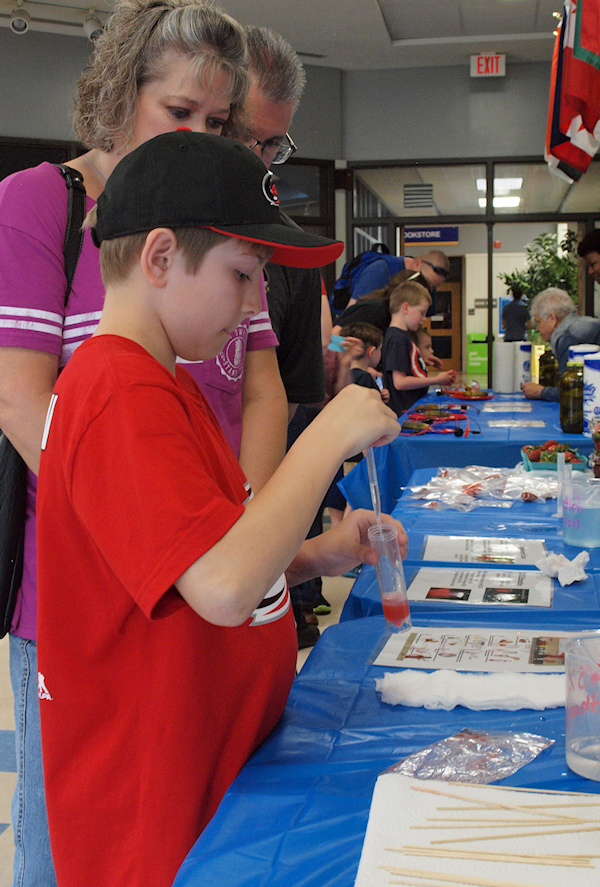
Organizer Sondi Hoffman, a biology teacher at the college, said she was pleased with every aspect of the event. “Everything was amazing. We were excited by the number of contributors who wanted to participate and by the number of visitors who came out when they had so many other options. We had more students and college departments volunteer this year, too.”
Hoffman said that close to 200 people of all ages took advantage of this year’s event. Seven of the participants left with prizes of science activity kits and a stuffed Kelvin, the NC Science Festival’s “spokesbot.”
“Pretty fantastic” is how Erin Bingham, the director of Programming at NC BioNetwork, described the event. “It was constantly steady” at her DNA extraction table. This was Bingham’s second time participating in the event, one of many she is part of each year. “It is super well organized and the people are great,” she said. “I love it here at Wayne.”
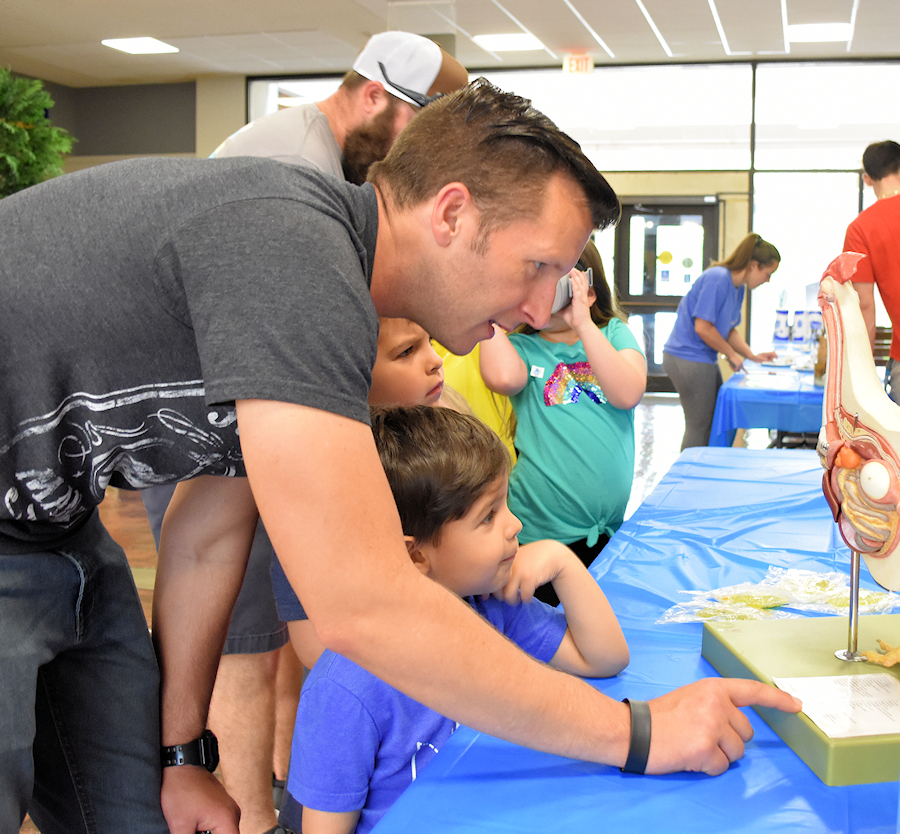
The college’s fair was an official event of the 2019 North Carolina Science Festival with its theme of “Made in North Carolina.”
In addition to a grant from the NC Science Festival, the WCC event received financial support from Mt. Olive Pickle Company and NC BioNetwork.
It is one of hundreds of NC Science Festival-affiliated events showcasing STEM (science, technology, engineering and mathematics) activities being held across the state during the month of April. To find locations of other events, go to www.ncsciencefestival.org/
Founded in 2010, the North Carolina Science Festival is the first statewide science festival in the United States. Through a series of community-based events each April (hosted by schools, colleges, libraries, museums, parks, businesses and other local organizations), the Festival celebrates the economic, educational, and cultural impact of science in North Carolina.
The NC Science Festival is presented by the Biogen Foundation and produced by Morehead Planetarium and Science Center at the University of North Carolina at Chapel Hill. For more information, visit www.ncsciencefestival.org.
Wayne Community College is a public, learning-centered institution with an open-door admission policy located in Goldsboro, N.C. As it works to develop a highly skilled and competitive workforce, the college serves 12,000 individuals annually as well as businesses, industry, and community organizations with high quality, affordable, accessible learning opportunities, including more than 70 college credit programs. WCC’s mission is to meet the educational, training, and cultural needs of the communities it serves.

